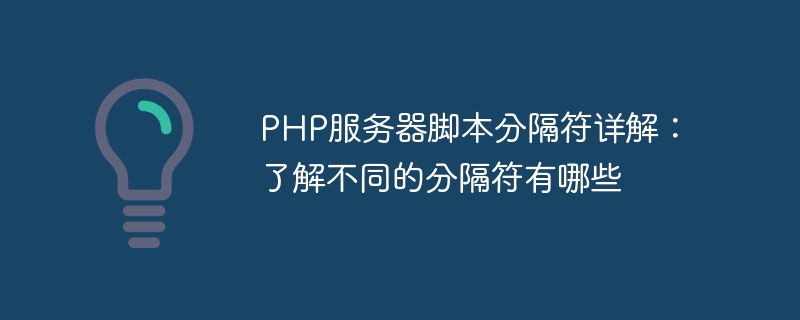

Detailed explanation of PHP server script delimiters: To understand the different delimiters, specific code examples are needed
In the process of writing PHP server scripts, we often need to use delimiters Characters are used to divide different code blocks to achieve better structure and readability. This article will introduce in detail the commonly used delimiters in PHP server scripts and give corresponding code examples.
1. Classification of PHP server script delimiters
In PHP server script writing, commonly used delimiters can be divided into the following types:
if($condition) { // 代码块内容 }
$myArray = [1, 2, 3]; // 定义数组 echo $myArray[0]; // 访问数组元素
function myFunction($params) { // 函数内部代码 } myFunction($arguments); // 调用函数
$name = "John"; // 双引号字符串 $age = '25'; // 单引号字符串
2. Code examples
Some code examples are given below to show the usage and scenarios of different delimiters:
$number = 10; if($number > 5) { // 如果条件成立,则执行以下代码块 echo "Number is greater than 5."; } else { // 如果条件不成立,则执行以下代码块 echo "Number is less than or equal to 5."; }
Welcome, !
Your age is:
$fruits = ["apple", "banana", "orange"]; echo "The second fruit is: " . $fruits[1];
function addNumbers($num1, $num2) { return $num1 + $num2; } $result = addNumbers(5, 10); echo "The sum of 5 and 10 is: " . $result;
$name = "John"; $greeting = "Hello, $name!"; $quote = 'He said, "I will be there soon."'; echo $greeting . " " . $quote;
Summary:
In PHP server scripting, different delimiters have their specific uses in different situations. Understanding and skillfully using these delimiters will help improve development efficiency and code readability. This article shows the usage and scenarios of these separators through specific sample codes, hoping to provide readers with some help in writing PHP server scripts.
The above is the detailed content of A Deep Dive into Delimiters for PHP Server Scripts: Mastering the Different Delimiters. For more information, please follow other related articles on the PHP Chinese website!